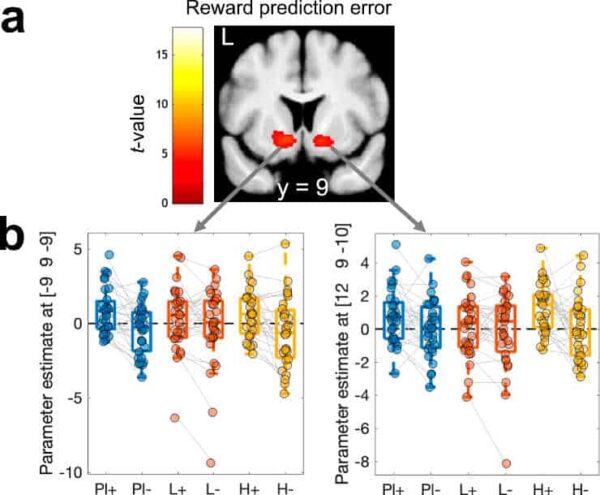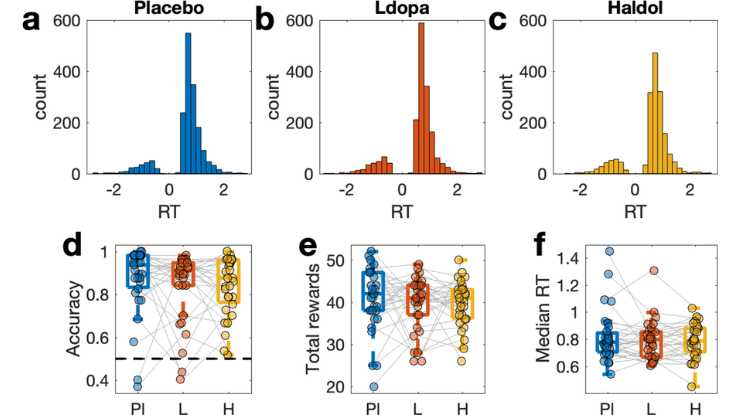A recent study adds to our understanding of the relationship between dopamine release and decision-making processes. The researchers discovered that when dopamine is released, decisions are made faster but are less accurate.
These findings support the notion that dopamine regulates decision thresholds during reinforcement learning. Dopamine has been linked to several aspects of reward learning and action selection.
The neurotransmitter is also vital for motivation and plays a function in a variety of mental conditions. Dopamine, according to one theory, affects how much effort is put into acts or how quickly they are completed.
Haloperidol vs L-dopa
In the new study, researchers used a learning exercise to examine this theory. They studied 31 male volunteers who were taught to link abstract symbols with rewards.
Under varied medication circumstances, all subjects performed distinct forms of the learning task. L-dopa, a dopamine precursor, was used to pharmacologically boost dopamine release in one case.
In another case, a low dose of the medicine Haloperidol was used to boost dopamine release. Participants in the control group were given a placebo.
The learning and decision-making processes involved were examined using novel computer models based on the distributions of the participants’ response times.
Trading Off Speed and Accuracy

Striatal regions coding for model-based prediction errors were identified by computing a main effect of prediction error across all drug conditions using GLM1 (a, flexible factorial model in SPM12 with within-subjects factor of drug condition). (b). The map in (a) is thresholded at p < .001 uncorrected for display p.
Credit: Nat Commun 14, 5369 (2023) CC-BY
Dopamine appears to govern a speed-accuracy trade-off in addition to its more well-known functions. This highlights the intricate relationship that exists between a person’s willingness to react slowly and make fewer mistakes and their tendency to react rapidly and make more mistakes.
The researchers were able to demonstrate that when dopamine release was increased pharmacologically, the parameter that represents this speed-accuracy trade-off was reduced under both L-dopa and Haloperidol.
The more quickly the participants made decisions, the greater the effect. Thus, the findings also demonstrate that computer simulations can offer a better understanding of how specific neurotransmitter systems operate.
“These findings link two previously rather distinct theories on the role of dopamine,”
said study contributor Professor Dr. Jan Peters, Professor of Biological Psychology of the University of Cologne.
Dopamine can influence effort in addition to motor response. Based on the speed-accuracy trade-off being shifted in favor of speed, the study data suggest a mechanism that could connect these two features.
It is still unknown, though, how much this process influences choices unrelated to incentives and what part motor functions play in these decisions. This has to be investigated further in future research.
Abstract:
Dopamine fundamentally contributes to reinforcement learning, but recent accounts also suggest a contribution to specific action selection mechanisms and the regulation of response vigour. Here, we examine dopaminergic mechanisms underlying human reinforcement learning and action selection via a combined pharmacological neuroimaging approach in male human volunteers (n = 31, within-subjects; Placebo, 150 mg of the dopamine precursor L-dopa, 2 mg of the D2 receptor antagonist Haloperidol). We found little credible evidence for previously reported beneficial effects of L-dopa vs. Haloperidol on learning from gains and altered neural prediction error signals, which may be partly due to differences experimental design and/or drug dosages. Reinforcement learning drift diffusion models account for learning-related changes in accuracy and response times, and reveal consistent decision threshold reductions under both drugs, in line with the idea that lower dosages of D2 receptor antagonists increase striatal DA release via an autoreceptor-mediated feedback mechanism. These results are in line with the idea that dopamine regulates decision thresholds during reinforcement learning, and may help to bridge action selection and response vigor accounts of dopamine.
Reference:
- Chakroun, K., Wiehler, A., Wagner, B. et al. Dopamine regulates decision thresholds in human reinforcement learning in males. Nat Commun 14, 5369 (2023)
